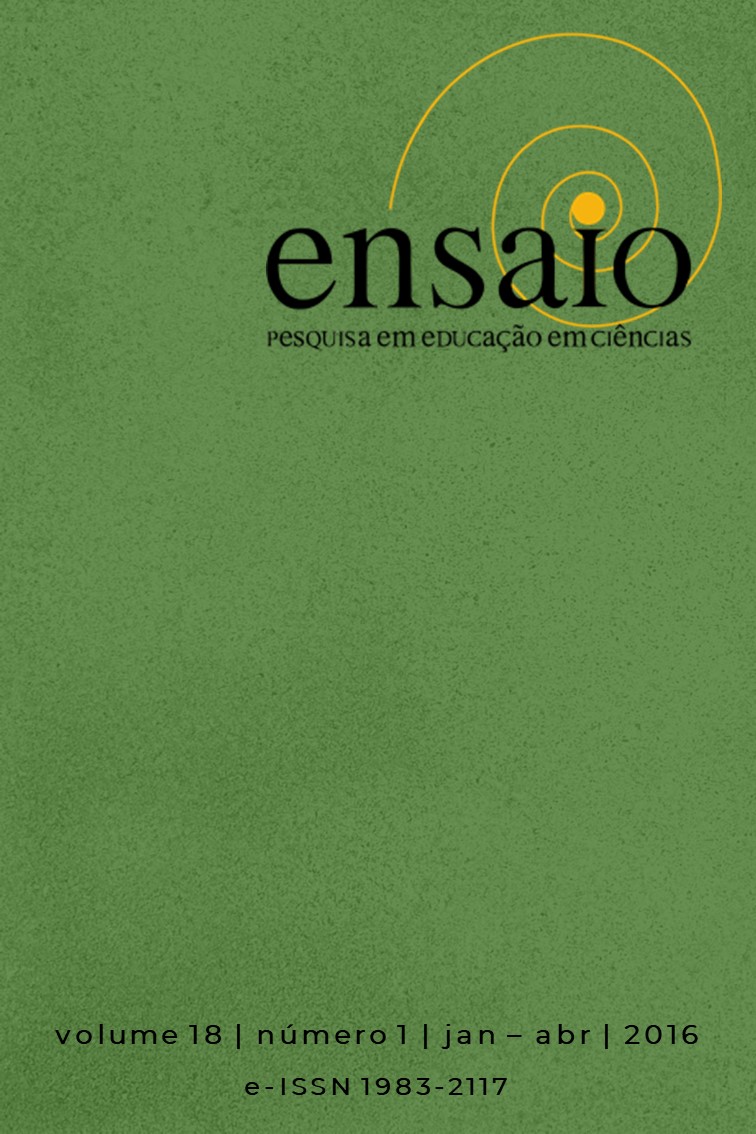MODELIZAR LA EXPRESIÓN DE LOS GENES PARA EL APRENDIZAJE DE ENFERMEDADES GENÉTICAS EN SECUNDARIA
MODELAR EXPRESSÃO GENÉTICA PARA O APRENDIZADO DE DOENÇAS GENÉTICAS NO ENSINO MÉDIO
DOI:
https://doi.org/10.1590/1983-21172016180104%20Keywords:
Modelización; Modelo de expresión de los genes; Prácticas científicas; Enfermedades genéticas; Anemia falciforme.Abstract
This study presents the design and analysis of a modelling-based activity about gene expression framed in a sequence about genetic diseases for secondary students. The research is part of a broader investigation embedded in a thesis on students' enactment of scientific practices in a Genetics learning context. We propose modelling as a way to visualize and to better understand the mechanisms involved in gene expression.
The research questions are: 1) How are the material models that secondary students elaborate in order to explain gene expression?; 2) to what extent do t hey explain gene expression using their material models and are able to relate them with sickle cell disease?
The results show that all groups mobilize genetic ideas and notions to build their models, although in some cases they limit to name and locate the elements involved in gene expression. On the other hand, modelling gene expression using the kit allows the students to construct an explanation about the mechanisms participating in gene expression. The five groups expanded and improved their models when they had to justify them in their writing reports or orally. This reveals the potential of using a modelling approach based on the stages proposed by Justi (2006).
Downloads
References
ALTSHULER, D.; DALY, M. J.; Y LANDER, E. S. Genetic mapping in human disease. Science, v. 322, p.881-888. 2008. [ Links ]
AZNAR, V.; PUIG, B. ¿Qué conocimientos movilizan un grupo de futuros docents para elaborar el modelo de infección por tuberculosis? Revista Eureka sobre Enseñanza y Divulgación de las Ciencias, en prensa, 2016. [ Links ]
PUIG, B.; JIMÉNEZ-ALEIXANDRE. Different music to the same score: teaching about genes, environment and human performances. En: T. D. Sadler (Ed), Socio-scientific issues in the classroom: teaching, learning and research (201-238). Dordrecht: Springer, 2011. [ Links ]
BAHAR, M.; JOHNSTONE, A. H.; SUTCLIFFE, R. G. Investigation of student's cognitive structures in elementary genetics through word association tests. Journal of Biological Education, v. 33(3), p.134-141. 1999. [ Links ]
DENZIN, N. K.; Y LINCOLN, Y. S. The discipline and practice of qualitative research. En: N. K. Denzin; Y. S. Lincoln (eds.). Handbook of Qualitative Research (1-28). Second Edition. California: Sage Publications, 2000. [ Links ]
DUNCAN, R. G.; REISER, B. J. Reasoning across ontologically distinct levels: Students' understandings of molecular genetics. Journal of Research in Science Teaching, v. 44(7), p. 938-959. 2007. [ Links ]
DUNCAN, R. G.; ROGAT, A. D.; YARDEN, A. A learning progression for deepening students' understanding of modern genetics across the 5th-10th grades. Journal of Research in Science Teaching, v. 46(6), p. 655-674. 2009 [ Links ]
DUSCHL, R. A.; GRANDY, R. E. Reconsidering the character and role of inquiry in school science: framing the debates. In: R. A. Duschl; R.E. Grandy (Eds.), Teaching scientific inquiry. Recommendations for research and implementation. Rotterdam: Sense Publisher, 2008, p. 1-37. [ Links ]
DUSO, L.; CLEMENT, L.; BARBOSA PEREIRA, P.; DE PINHO ALVES FILHO; J. Modelização: uma possibilidade didática no ensino de biologia. Ensaio Pesquisa em Educação em Ciências, vol. 15, núm. 2, mayo-agosto, 2013, pp. 29-44. [ Links ]
JIMÉNEZ ALEIXANDRE, M. P. Determinism and Underdetermination in Genetics: Implications for Students' Engagement in Argumentation and Epistemic Practices. Science & Education, v. 2, p. 465-484. 2012. [ Links ]
JIMÉNEZ ALEIXANDRE, M. P. Las prácticas científicas en la investigación y en el aula de ciencias. Conferencia plenaria. XXV Encuentro de Didáctica de las Ciencias Experimentales, 5-7 de septiembre de 2012. [ Links ]
JUSTI, R. La enseñanza de ciencias basada en la elaboración de modelos. Enseñanza de las ciencias, v. 24(2), p. 173-184. 2006. [ Links ]
KAMPOURAKIS, K.; REYDON, T. A. C.; PATRINOS, G. P.; STRASSER, B. J. Genetics and Society-Education Scientifically Literature Citizens: Introduction to the Thematic Issue. Science & Education, v. 23, p. 251-258. 2014. [ Links ]
KNIPPELS M. C. P. J.; WAARLOO, A. J.; BOERSMA, K. TH. Design criteria for learning and teaching genetics. Journal of Biological Education, v. 39(3), p. 109-112. 2005. [ Links ]
LEHRER Y SCHAUBLE. Seeding evolutionary thinking by engaging children in modeling its foundations. Science Education, v. 96(4), p. 701-724. 2012. [ Links ]
LEWIS, J.; WOOD ROBINSON C. Genes, chromosomes, cell division and inheritance- do students see any relationship? International Journal of Science Education, v. 22(2), p. 177-195. 2000. [ Links ]
LEWONTIN, R. C. What do population geneticists know and how do they know it? En: R. Creath; J. Maienschein (Eds.), Biology and epistemology. Cambridge: Cambridge University Press, 2000. p. 191-214. [ Links ]
MENDONÇA, P.C.C.; JUSTI, R. An instrument for analyzing arguments produced in modeling-based Chemistry lessons. Journal of Research in Science Teaching, v. 51(2), p. 192- 218. 2014. [ Links ]
NATIONAL RESEARCH COUNCIL. A Framework for K-12 Science Education: Practices, crosscutting concepts, and core ideas. Washington, DC: National Academies Press, 2012. [ Links ]
ORGANISATION FOR ECONOMIC COOPERATION AND DEVELOPMENT (OECD). PISA 2015 Draft Science Framework. OECD, 2013. [ Links ]
PASSMORE; C. M.; Y SVODOBA, J. Exploring opportunities for argumentation in Modelling Classrooms. International Journal of Science Education, v. 34(810), p. 1535-1554. 2011. [ Links ]
TSUI, C. Y.; TREAGUST, D. F. Understanding Genetics: Analysis of Secondary students´conceptual status. Journal of Research in Science Teaching, v. 44(2), p. 205-235. 2007. [ Links ]
VENVILLE, G.; e DAWSON, V. The impact of an argumentation intervention on Grade 10 students' conceptual understanding of genetics. Journal of Research in Science Teaching, v. 47(8), p. 952-977. 2010. [ Links ]
VENVILLE G.; DONOVAN, J. How pupils use a model for abstract concepts in genetics. Journal of Biological Education, v. 43(1), p. 6-14. 2008. [ Links ]


